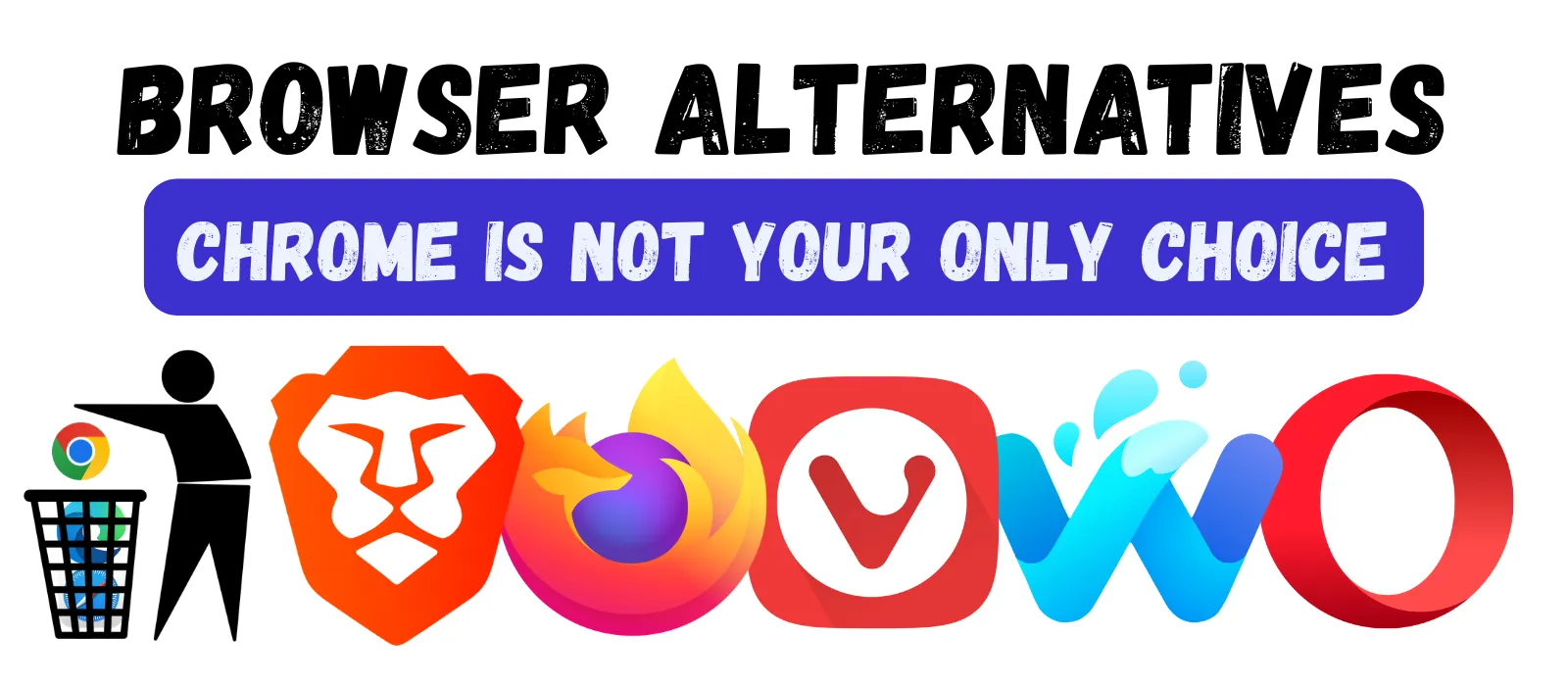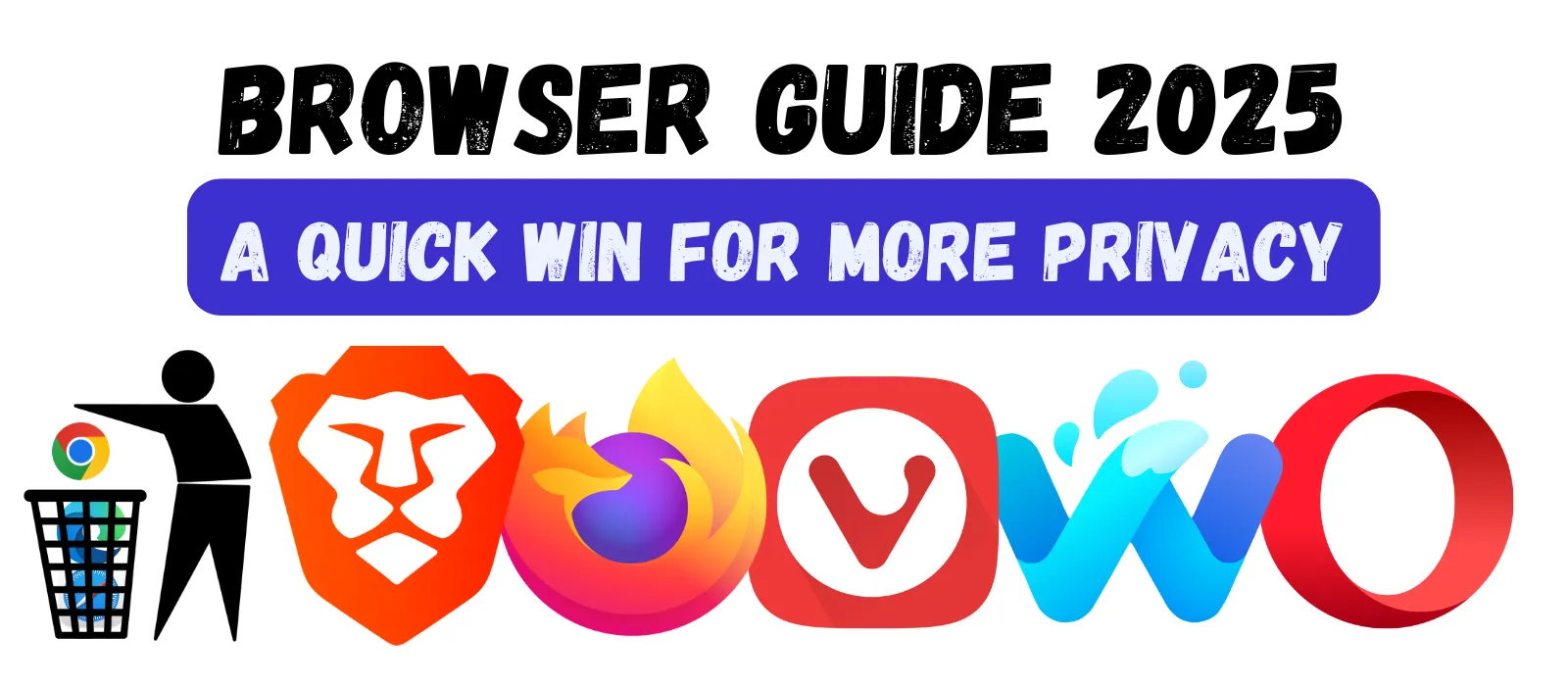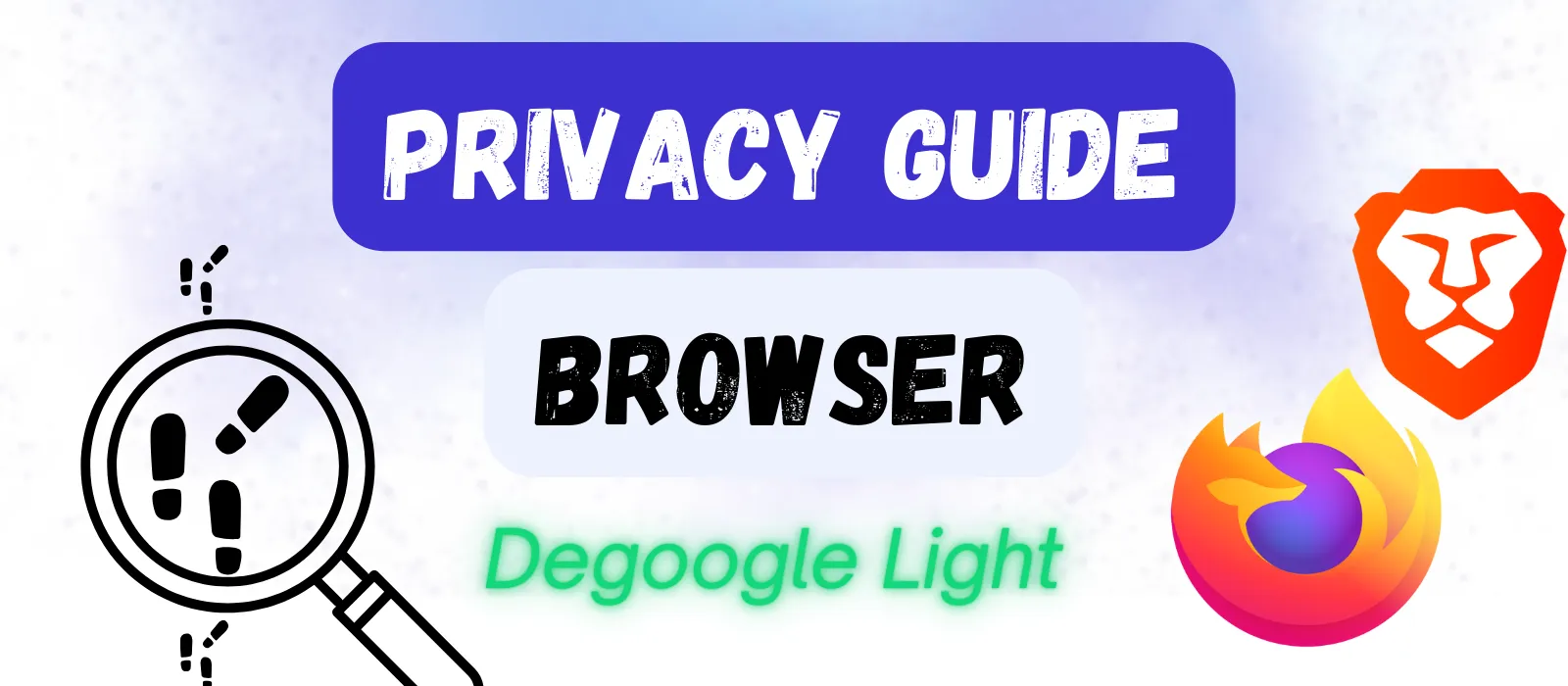
Alternatives to Google Chrome
Chrome is a data privacy nightmare, yet it holds a roughly 70% share of the global browser market.
This article highlights some non-Big Tech alternatives and what makes them unique.
What Is A Browser?
Your browser is the program you use to “browse” the internet. It knows every website you visit, every search you make and often every form you fill out. Most people use Google Chrome, which serves as a massive data collection tool for the world’s largest advertising company.
Why Switch from Chrome (or Edge/Safari)?
Besides Chrome, there are two other browsers that are firmly in the Big Tech camp: Microsoft’s Edge and Apple’s Safari browser. Together with Chrome, these three browsers account for roughly 90% of all browser usage worldwide.
While Edge and Safari are modestly better than Chrome when it comes to privacy, they aren’t great. But Chrome is particularly worrisome due to its broad domination of the market:
Data collection: Chrome tracks your browsing habits, search history and online behavior to build detailed profiles for Google’s advertising business. Imagine being able to track 70% of all internet usage…
Google’s control: As web standards evolve, Google’s dominance means it increasingly influences how the internet works, potentially stifling innovation and competition. Which leads right into the next point…
Manifest V3: This is the name of Google’s latest changes to its browser extension rules. While they cover a range of areas, some of these changes limit the effectiveness of ad blockers and privacy tools.
The Logic Behind the List
A comprehensive list of alternative browsers would be rather long and constantly changing. I also wouldn’t be able to say much about many of them.
Since this site is meant to be helpful to the average person, I will focus on browsers with broad OS compatibility – which also happen to be the browsers I am most familiar with. Each browser listed here is compatible with Windows, macOS, Linux, Android and iOS (excl. Waterfox – it doesn’t yet work on iOS).
This is not a full review of these browsers. It is simply meant to serve as an overview of what is out there and help you narrow down your options. Since changing browsers is a relatively easy process, there is nothing stopping you from trying out a couple different candidates before settling on your personal favorite.
Stay in the Loop
Get updates on new guides, tools, and tips to help you degoogle your life.
The Browsers
Here are the browsers I’ll be covering: Firefox, Brave, Opera, Vivaldi and Waterfox
These are browsers I have used – and I could easily go back to any of them. The differences between these browsers are mainly “under the hood” and are only noticeable across a handful of features.
Let’s take a quick tour of these five browsers.

Firefox
Mozilla’s open-source browser has been the primary alternative to the Big 3 (Chrome, Safari, Edge) for years, offering strong privacy features and extensive customization. Made by a US-based foundation.
Key strength: A proven alternative with a relatively large user base, it’s a jack-of-all-trades, master of none
✅ Pros
- ✔️ Degoogled engine (runs on its internally developed Gecko platform, rather than Google's Chromium engine)
- ✔️ Strong privacy protections built-in
- ✔️ Extensive add-on/extension ecosystem
- ✔️ Regular security updates
- ✔️ Non-profit organization behind it
- ✔️ Open source code (meaning that anyone can examine the code for security loopholes)
🔴 Cons
- ❌ Mozilla depends partly on Google for funding (paid to have Google as its default search engine – a setting you can easily change)
- ❌ Can feel less polished than some alternatives
- ❌ Some websites occasionally have compatibility issues (rare)
- ❌ Slightly smaller extension library than Chrome
Download it at: www.firefox.com

Brave
Built on Chromium but strips out Google’s tracking, Brave provides solid ad and tracker-blocking by default and is quickly gaining popularity. Made by a San Francisco-based company.
Key strength: Solid default ad-blocker and privacy features
✅ Pros
- ✔️ Built-in ad and tracker blocking
- ✔️ Chrome extension compatibility
- ✔️ Advanced privacy features
- ✔️ Built-in Tor browsing mode
- ✔️ Open source code
🔴 Cons
- ❌ Still based on Google's Chromium engine (but highly degoogled)
- ❌ Cryptocurrency features may not appeal to everyone
- ❌ Can seem somewhat pushy in its promotion of own products (VPN, crypto, search, AI, etc.)
Download it at: www.brave.com

Vivaldi
A feature-rich browser created by former Opera developers, focusing on customization and power-user features. Made by a company based in Oslo, Norway.
Key strength: Productivity emphasis with Swiss army knife-level customization, incl. advanced tab management
✅ Pros
- ✔️ Excellent tab management features
- ✔️ Highly customizable interface
- ✔️ Built-in ad and tracker blocking
- ✔️ Great for power users who want fine-grained control
- ✔️ Chrome extension compatibility
🔴 Cons
- ❌ The amount of options can be overwhelming for casual users
- ❌ More resource-intensive than simpler browsers
- ❌ Based on Chromium
- ❌ Code is not open source
Download it at: www.vivaldi.com

Waterfox
A Firefox fork that emphasizes privacy, legacy extension support and user control over having the latest and greatest features. Made by a London-based company.
Key strength: Similar in many ways to Brave browser (ad-blocking/privacy), but uses Firefox’s technology rather than Chromium
✅ Pros
- ✔️ Based on Firefox but with further enhanced privacy features
- ✔️ Supports older Firefox extensions
- ✔️ No telemetry or data collection
- ✔️ Independently developed
- ✔️ Open source code
🔴 Cons
- ❌ Less mainstream support
- ❌ Fewer users means less community troubleshooting
- ❌ No iOS app
- ❌ Occasional compatibility issues with newer web standards (like Firefox)
Download it at: www.waterfox.net

Opera
A long-standing browser known for being more resource-efficient than many other options while also being highly customizable. Company is based in Oslo, Norway, with majority Chinese ownership.
Key strength: Always innovating – there are regularly new features to try out
✅ Pros
- ✔️ Built-in ad blocker and VPN
- ✔️ Lots of features and options for customization (AI, messenger integration, music controls)
- ✔️ Emphasis on having a stylish, user-friendly interface
- ✔️ Chrome extension compatibility
🔴 Cons
- ❌ Majority owned by a Chinese consortium, raising some privacy concerns
- ❌ VPN is a proxy, not a true VPN (limited encryption)
- ❌ Based on Chromium
- ❌ Code is not open source
Download it at: www.opera.com
Of these 5 browsers, I would recommend Firefox or Brave for most users. They cover all of the basics well and are a massive step up in terms of privacy compared to Chrome. And as the two most popular browsers on this list, users should be able to find help quickly if it’s ever needed.
Honorable Mentions
If those first five weren’t your thing, here is another set of privacy-respecting options:
LibreWolf – Privacy-focused browser for Windows, macOS and Linux PCs
Floorp – A highly customizable browser for Windows, macOS and Linux
Mullvad Browser – Very privacy-focused browser for Windows, macOS and Linux
DuckDuckGo Browser – A relatively new privacy-focused browser for Windows, macOS, Android and iOS
Zen – A customizable, privacy-focused browser currently only available for Windows
Orion – Mac only, privacy-focused browser from Kagi
For further browser comparisons, see https://privacytests.org/ and https://browsers.avoidthehack.com/
Found Your Next Browser?
If you are ready to try one of these browsers, check out the Browser Guide. It will give you a step-by-step walkthrough for installing your new browser on your PC and Android devices.
The Browser Privacy Guide provides tips on how to make your new browser even more private and personalized to your needs.


